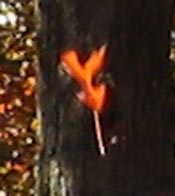

Fall in Philadelphia -- by Shai
Gluskin
Visit TorahQuest
to study from and participate in the evolving 21st
Century Torah Commentary. Your commentary may be words or
it might be from the plastic arts. At TorahQuest you
follow your spark. Learn also how to bring it to a
classroom setting.
Israel. At
this dark time in Israel I'd like to share some poetry
and punditry. For me, art is a good response to darkness.
It doesn't try to answer, it simply leaves room for the
heart to resonate with human feelings that can never be
judged right or wrong. The kids poetry is here because
it's fun. The punditry is here because I am amazed and
thankful that I can find voices which I find sane in this
time of craziness. Most of the articles are by Israeli
authors.
Israel Poetry
Israel Poetry for Kids, their
Parents, Friends and Caretakers
Israel Punditry
Etc.
Poem:
The Place Where We Are Right, by Yehuda
Amichai. I first read this poem while visiting
the Museum
on the Seam in Jerusalem on August 20, 2001. This
poem contrasts "love and doubts" with "being right." The
one leads to fertility, the other to destruction.
Song: A Home Loving
Man, from the Arik Einstein/Miki Gavrielov album by
the same name (produced in 1986). I'm moved by the simple
desire to live a normal life. I haven't been able to find
this album at the typical American internet vendors. I
recently bought it at Ben Gurion Airport.
Poems of Alex Lazarus. These
are rich poems written from the soul of someone
living/visiting Israel/Jerusalem during the first year of
the intifada. Alex is a rabbinical student at the
Reconstructionist Rabbinical College.
Poem: I'll Be Magnified
and Sanctified by Yehuda Amichai. The title of
the poem evokes the Kaddish prayer (May God by Magnifed
and Sanctified), used in Judaism by mourners to praise
the divine. It is also used as a segue between different
parts of a Jewish prayer service. Here the poet imagines
God's desire for sanctification through ever-increasing
circles of empathy.
Song: One Drop at a
Time, from the Arik Einstein/Miki Gavrielov album
A Home Loving Man. This song inludes a series of
negative statements about everything the poet
doesn't want to do. It is punctuated with a
refrain expressing the poet's desire to "add one drop at
a time." In a time when it is difficult to know exactly
what to do, I found this song comforting.
ETC.
The Lorax and Deuteronomy by
Shai Gluskin
Drawing: Joseph by Day
and by Night by Sophia Gluskin-Braun
Drawing: Hanukkah
Mandala by Sophia Gluskin-Braun
The Way of Man
According to the Teaching of Hasidism Material
inspiring for the Yamim Noraim, the High Holy
Days.
Photo: The
Joy of Collaboration. From the Jewish
Reconstructionist Federation's August, 2001 Educators'
mission to Israel .
Photo: Jewish Planes
by Wendy Marx
Photo Lesson: Use
evocative photo of an Israeli flag hanging over a street
sign where Arabic has been crossed out. Discussion
questions and background provided to spark discussion
aimed at getting teens and adults to think about flags,
language, democracy and competing nationalities.
Swim On - photo by
Shai Gluskin
Let Freedom Ring - photo
by Shai Gluskin
Warning Light - photo
by Shai Gluskin
Link to JRF web site
www.jrf.org.
Israel: Punditry
Ha'aretz op-ed
piece by Ze'evv Sternhell, September 12, 2003.
A time to act. A passionate call to
peace activists in Israel to take to the streets against
the Sharon government.
Ha'aretz op-ed
piece by Amira Hass(January 15, 2003) "[The]
Israeli majority is not ready to listen to hints that
perhaps the military policies prevent, in the short term,
some of the attacks and destroy the infrastructure, but
in the long run create hundreds more volunteers for the
unofficial Palestinian armies, and increase the danger of
terrorism."
Ha'aretz op-ed
piece, (December 4, 2002) Fundamentalist
logic, by Amira Hass. Hass sees fundamentalist
thought taking over on both the Israeli and Palestinian
sides, each group holding out for a "big war" in which it
will win.
Ha'aretz op-ed
piece, (November 19, 2002). Brothers, the
village is burning, by Avirama Golan. The
author claims that the settler movement has embraced the
rhetoric and attitude of classic diaspora existance and
is in fact posing the greatest threat to the Zionist
enterprise.
Ha'aretz op-ed
piece (June30, 2002). A million people
under curfew, by Gideon Levy. "Few if any
Israelis can understand what it means to be under full
curfew for 10 days, incarcerated with the children in a
crowded house, usually without an air conditioner or a
computer or games to play, maybe a barely functioning
television set."
Ha'aretz op-ed
piece (June 26, 2002). Both sides are
wrong, by Amira Hass. A chilling look at
the inability of both sides to recognize the horror it is
inflicting on the other.
Two items in response to
Bush's speech. (June 25, 2002) 1. An eyewitness
description of Shimon Peres' (very negative) response to
Bush's speech. 2. Editorial from the Israeli daily Yediot
Ahoronot: "There was nothing (in Bush's speech)
but the narrow worldview of a person who is willing to
help everybody become an imitation American, and wants
nothing to do with anybody else. Nothing but a promise
that, while the roses continue to bloom in the White
House garden, the red spots seen on Israeli and
Palestinian streets will be no flowers." Read
more.
Ha'aretz op-ed
piece (June 23, 2002). Send more
teaspoons, by Doron Rosenblum. A practical
argument for why violence won't put an end to terror.
Haaretz Editorial
(May 1, 2002) Dishonorable Conduct in War.
"There were more than a few occasions in which private
property owned by Palestinian families was vandalized
indiscriminately, and without any visible purpose other
than vandalism for its own sake."
Ha'aretz
op-ed piece (April 11, 2002). The
Turning Point by Meron Benvenisti. "Leaders who
inflict great sacrifices upon their people cannot let it
be known to all and sundry that they were wrong, so they
make the goals absolute: 'A war for our homes' or 'a war
for our existence' - goals with infinite price tags. The
issue of the relationship between the goal to its price
is decried as irrelevant, and raising rational arguments
is considered blasphemy, an attempt to quantify something
that has no price."
Ha'aretz op-ed
piece (April 1, 2002). The Abyss at the
End of Victory by Akiva Eldar. "Those who
are not ready to allow the attacks and the extremists to
seal the coffin of peace can find a ray of hope in an
article that was published last week by the Palestinian
Center in Washington."
New York Times Op-Ed
(March 30, 2002).More War is Not the Route to
Israeli Security by Yossi Beilin. "The Israeli
war against the terrorist infrastructure will give birth
to more terrorists because the terrorist infrastructure
lies within people's hearts."
Ha'aretz op-ed
piece (March 7, 2002) Balata Has
Fallen by Ze'ev Sternhell. "A society in
which dozens of children are killed as a result of army
operations can easily lose its last remaining moral
inhibitions. "
Haaretz Editorial
(March 6, 2002) titled, The Helpless
Government. "It is not the existence of Israel
that is at stake, but the existence of the settlements,
which Sharon has fostered and nurtured for a
generation."
Haaretz Editorial
(December 18, 2001) titled, A Glimmer of
Hope, is a response to Yasir Arafat's December 16
speech in Arabic calling on all Palestinian terror to
stop.
Haaretz Editorial
(November 2, 2001) which advocates for immediate
withdrawal of the Israel Defense forces from Palestinian
towns.
Haaretz Editorial
(August 26, 2001) which advocates for immediate
withdrawal of Jewish settlers from Hebron.
top
These entries into my omer journal, which begin on the
29th day of the counting, were written in 2001, and are my
personal response based on inspiriation from Kabbalah and my
life. Some are missing because I did not include entries for
Shabbat.